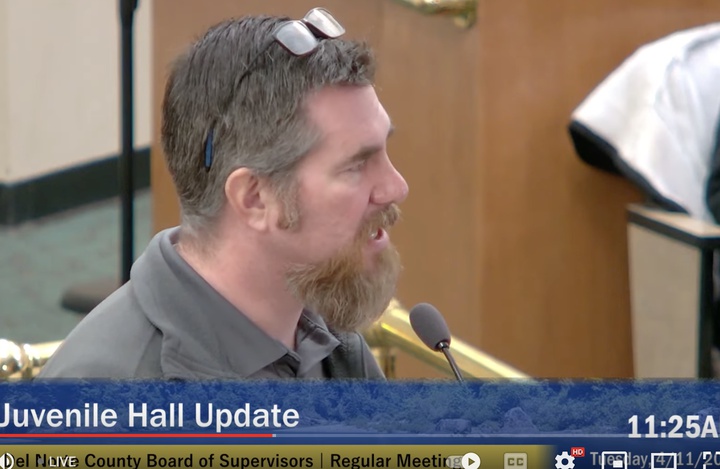Jessica Cejnar Andrews / Tuesday, April 11, 2023 @ 3:07 p.m. / Local Government, Youth
Del Norte's Probation Chief Sets Out to Restructure Juvenile Hall Ahead of June 30 Detention Center Closure

Probation Chief Lonnie Reyman updates Board of Supervisors on juvenile hall closure process. | Screenshot
Previously:
###
Del Norte County’s chief probation officer is still following the fog line toward a June 30 closure of the community’s 24-7 juvenile detention facility.
But as he and his staff figure out what a probation youth center would look like and who it would serve, Lonnie Reyman said he wants to ensure any changes made to the facility itself would be “non-destructive” — that it could go back to a secure institution in the future.
After Reyman told Del Norte County supervisors on Tuesday that he expects to bring a firmer timeline for the impending closure to them next month, District 2 representative Valerie Starkey called for a stakeholders group or an ad-hoc committee.
“We’re reimagining something that, yeah, other communities have done, but we necessarily haven’t,” Starkey told Reyman. “I would not be opposed and I’m actually highly encouraging for us to have some sort of ad-hoc stakeholder group that reimagines what juvenile services are going to look like.”
This was a stipulation Reyman readily agreed to, adding that input and buy-in from probation department staff is also important.
The number of youth currently on probation are in the mid-20s, Reyman said.
A month after supervisors gave Reyman the green light to begin the process of closing the community’s 24-7 juvenile detention center, the probation chief said he has discussed how that would impact his staff; programs and services for the youth in the county’s care; and the facility itself.
Reyman said his department is referring to juvenile hall as the “probation youth center” and will continue programs it already offers such as the Paxton/Patterson career technical education skills class, Moral Reconation Therapy and “Seeking Safety” trauma therapy.
Facilities manager Jordan Anderson is also reaching out to local agencies such as the Del Norte County Behavioral Health Branch and the Child Welfare Division to discuss what programs could be facilitated through the youth center and what would continue to be offered in the community.
Reyman said his department’s goal is to avoid overlapping programs that are in place elsewhere. He noted that these services would primarily be for youth on formal and informal probation.
The probation department is also looking at ways to serve “at-risk” youth, those who are considered delinquent under Section 601 of the California Welfare and Institutions Code, but whose actions don’t rise to “criminal levels,” Reyman said.
“We’ve had some initial discussions on what that is and how we can wrap our arms around it without getting too broad,” he said, adding that runaways could fall under that category. “The statute says they’re out of control. I think defiant might be thrown in there as well. Truancy issues are found in 601. We think it is a good starting point to at least have those conversations and see how we can integrate those youth in.”
Sometimes parents look to the probation department for help with a child that, under Section 601, is considered out of control, Reyman said.
“Typically we’ve not been able to do a whole lot, but looking at it through this lens with this resource available, we might be able to bring those families in and integrate them into these programs,” he said.
The probation department is also conducting an assessment of the youth center building itself, determining which areas they could use for the new programs it plans to implement and which need to continue to be available for taking juvenile offenders into custody.
This includes processing youth for temporary custody arrangements as well as preparing them for transportation to other detention facilities in Humboldt and Shasta counties.
Reyman told supervisors that he is talking with other counties to potentially house Del Norte youth if they run into population issues at the other facilities or if inclement weather impacts local roads.
Though she noted that it’s only a possibility at this point, Starkey said Del Norte County could get a grant to help pay for cooling beds, which provides temporary placement for youth without processing them into the juvenile justice system.
“Let’s say somebody needs to be booked into custody, if we have these cooling beds it would mean we have the ability to place those kids some place in the community like a high-end foster care kind of system,” Starkey said. “I want to say there are things in motion to supplement the closure or suspension of juvenile hall. There are going to be other options.”
Reyman praised the cooling beds idea and said much of the process for detaining youth will stay the same.
This statement prompted District 4 Supervisor Joey Borges to try to change the narrative, pointing out that the discussion around closing juvenile hall came across to the community as a negative.
“Technically we’re still able to take kids in. We’re still able to get them where they need to be,” Borges said. “Would it be more of an appropriate statement to say it’s not necessarily that we’re closing juvenile hall, but it’s more of a restructuring of juvenile hall.”
Reyman acknowledged that that was a fair statement, but said Del Norte is losing a resource to detain youth locally. But, he said, the community can “take it and make something good come out of it.”
Reyman has proposed closing the juvenile detention facility since October as the best solution to his department’s inability to meet state staffing requirements, which require a male and female staff member along with a supervisor be on duty during each shift.
CLICK TO MANAGE